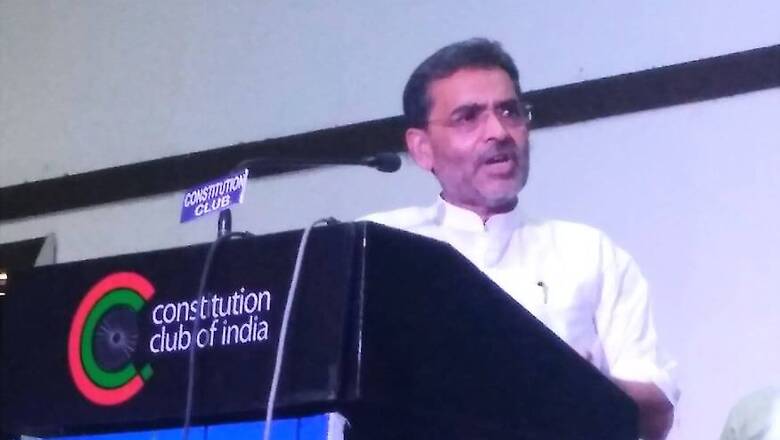
views
New Delhi: Union Minister Upendra Kushwaha on Sunday said the collegium system for selection of judges of high courts and the Supreme Court lacked transparency and was a "black spot" on Indian democracy, and called for more representation of people belonging to SC, ST, Dalit communities in the higher judiciary.
According to the Union Minister of State for Human Resource Development, the appointments to the higher judiciary are done in "opaqueness" and not in a democratic manner.
"The gates are closed for ST/ST and Dalits and even meritorious students who are willing to become judges. We want the gates to be opened," said the leader of the Bihar-based Rashtriya Lok Samata Party (RLSP), an ally of the BJP.
Launching a campaign on the issue here, he alleged that under the collegium system, people were indulging in nepotism and judges were only concerned about choosing their "successors".
Referring to Prime Minister Narendra Modi and President Ram Nath Kovind, he has said if a tea stall vendor can become a prime minister and a son from a fishing community can become the president of the country, why the weaker sections are being deprived from getting their rights.
"The collegium system in its present form is a black spot on Indian democracy," he said, underlining that it was up to the court to stem the rot in the system and ensure "transparency and "inclusiveness".
The NDA government had passed the National Judicial Appointments Commission (NJAC) Act but it was struck down by the Supreme Court, Khuswaha lamented.
The low representation of people belonging to ST, ST and OBC communities as well as women and other disadvantaged groups in the Indian judiciary leads to a perceived lack of faith among these sections in the judicial system which does not augur well for the institution, he said.
He said the campaign launched by his party on the issue was not an agenda of any single party, nor a vote bank politics.
Raising his concern over the functioning of the collegium system, leading constitutional expert Subhash Kashyap said the decision of the Supreme Court to stuck down NJAC was "unconstitutional".
"There is no country in the world where Supreme Court judges chose their own brother judges," Kashyap said at the event.
He said even B R Ambedkar had said he would not trust the future chief justices of India in matters of appointment as they could, as normal human being would, be susceptible to "prejudices".
Even in matters of removal of judges for "misbehaviour" and "incapacity", the Supreme Court has reservations. "They talk of impeachment for removal of judges though the Constitution has no such provision," he said.
Kashyap voiced strong opposition to judges taking up jobs after retirement, maintaining that it hampers the "independence of judiciary".
He referred to reports which suggested that 80 per cent of the judges across the country are relatives of sitting judges.
"There is much inbreeding in the system and you talk of transparency in the judiciary," he said as he hit out at retired judge of the Supreme Court Bisheshwar Prasad Singh who earlier spoke at the event.
Justice Singh said that the appointment process was transparent.


















Comments
0 comment